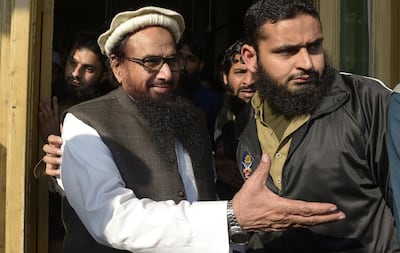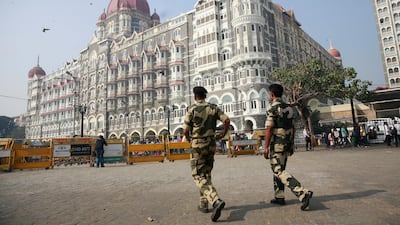Pakistan’s decision to release Hafiz Saeed from house arrest has stoked anger among the victims of the 2008 terror attacks in Mumbai, which Saeed is said to have masterminded.
Saeed heads the Jamaat-ud-Dawa, which purports to be a charity but is considered by India and the United States to be a front for Lashkar-e-Taiba, a group the two countries and the European Union have designated as a terrorist outfit.
He was released on Friday after 10 months of house arrest and just two days before the ninth anniversary of the Mumbai attacks, which lasted from November 26-29.
Ten terrorists, arriving in Mumbai from Pakistan, carried out a series of coordinated attacks across the city in which 166 people died and more than 600 were injured. The only attacker captured alive, Ajmal Kasab, admitted to being from Lashkar-e-Taiba. He was hanged by India in November 2012.
India and the US have pressed Pakistan to punish Saeed, but Pakistan has said the evidence provided by India is not strong enough to put him on trial.
____________________
Read more:
India outraged after Pakistan court releases Mumbai attacks 'mastermind'
US rebukes Pakistan over release of alleged Mumbai attacks kingpin
_____________________
The longer Saeed stays free, the longer justice fails to be done, said Selvan Durairaj, whose brother Jaykumar, a 33-year-old employee at the telephone exchange in Tuticorin, in Tamil Nadu, was killed at the Chhatrapati Shivaji railway terminus in Mumbai.
Mr Durairaj’s brother had travelled to Mumbai for a holiday, but he was shot on the first day of the attacks. The bullets that killed him may well have come from Kasab’s gun, Mr Durairaj was told by the police when he went to Mumbai to collect his brother’s body.
At the time of Kasab’s hanging, Mr Durairaj had begun to feel “a little sorry for him”, he said. “It is never pleasant to take a life.” Besides, Kasab was only a pawn in a larger game of terrorism that was being played out of Pakistan, he said.
“The more I read about these things, the more I realise that it’s the people sitting in Pakistan who plan these kinds of attacks. They’re the ones who really deserve the maximum punishment,” he said.
But Saeed's release from house arrest showed that Pakistan was reluctant to act against terrorists, Mr Durairaj said. “So many countries have found that Lashkar-e-Taiba is a terrorist group. So much evidence is there,” he said. “If [the Pakistani government] lets him go in this manner, then they themselves somehow must be involved in terrorism, I think.”

Mukesh Agrawal, who was shot twice at the cafe he ran at the Chhatrapati Shivaji terminus food court, said the news of Saeed’s release was dispiriting.
Mr Agrawal’s interest in Saeed perked up after the US government offered a $10 million (Dh36.7m) bounty for information leading to his arrest, in 2012. He followed Saeed’s fortunes closely, he said, and saw last Thursday that Saeed was due to be released.
“This weekend, I’ve just been at home, because it was 26/11 [the anniversary of the attacks],” he said. “I haven’t even turned on the television to see what has happened since Saeed’s release.”
The prospect of justice now seems remote and hopeless to Mr Agrawal. He was briefly encouraged when the Donald Trump administration, in July, withheld roughly $350 million in defence funding to Pakistan. The decision followed a US state department report that Pakistan “did not take substantial action” against terror networks operating from its soil.
But last month, the US senate delinked the funding from Pakistan’s success in curbing the Lashkar-e-Taiba, paving the way for Saeed’s release.
That senate decision came as a surprise, Mr Agrawal said. “It almost seems as if no government can touch Pakistan in any way.”
He was always realistic about India’s ability to influence the trial process in Islamabad, he said. Kasab was hanged after four years of trial and appeals in Mumbai, Mr Agrawal noted, so he assumed that it would take far longer to persuade Pakistan to try and punish its citizens.
Even so, he is disappointed by India’s efforts to pressure the Pakistani government to bring Saeed to trial.
“It feels like the issue is just slipping away altogether now,” Mr Agrawal said with a sigh. “It feels like there’s no point in even discussing it.”
____________________
Read more:
Pakistan bans film on Mumbai attacks following protest from accused
Mumbai gunman's execution brings shock, peace of mind
____________________

